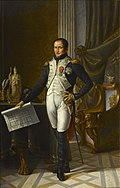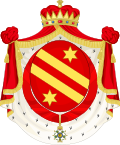House of Bonaparte
The House of Bonaparte was an imperial and royal European dynasty founded by Napoleon I of France in 1804, a Corsican military leader who rose to power and transformed the French Republic into the French Empire. The dynasty ruled from 1804 to 1815 and again from 1852 to 1870.
Napoleon I of France
Napoleon Bonaparte is the most significant person associated with the Bonaparte family because he created the First French Empire that conquered much of Europe in the early 19th century. He was elected as first consul of France on November 10, 1799 with the help of his brother, Lucien Bonaparte, speaker of the Council of Five Hundred. He later crowned himself Emperor of the French in December 2, 1804 and King of Italy in May 26 1805. He then made his elder brother Joseph (1768–1844) king of Naples (1806–1808) and then of Spain (1808–1813), his third brother Louis, king of Holland (1806–1810), and his youngest brother Jerome Bonaparte, king of Westphalia(1807-1813).
Napoleon's son Napoleon François Charles Joseph (1811–1832) was created king of Rome (1811–1814) and was later styled Napoleon II by loyalists of the dynasty, though he only ruled for two weeks after his father's abdication. Charles Louis Napoléon (1808–1873), son of Louis Napoléon, was president of France in 1848 and emperor in 1852 until 1870, reigning as Napoléon III. A political movement for Corsican independence surfaced in the 1990s which included a Bonapartist restoration in its programme.
Crowns held by the family
Emperors of the French
- Napoleon I (1804–1814, 1815), also King of Italy (1805–1814)
- Napoleon II (1815), styled King of Rome from birth, but never reigned
- Napoleon III (1852–1870), nephew of Napoleon I and son of Louis I of Holland
Kings of Holland
Kings of Naples
King of Westphalia
- Jérôme I (1807–1813)
King of Spain
- Joseph I (1808–1813)
Grand Duchess of Tuscany
- Elisa Bonaparte (1809–1814)
House Of Bonaparte Media
"The Four Napoleons", 1858 propaganda image depicting Napoleon I, Napoleon II, Napoleon III, and Louis-Napoléon
Arms of Charles-Maria Buonaparte
Arms of Napoleon I and Napoleon II, as Emperor of the French
Arms of Napoleon I and Napoleon II, as Kings of Italy
Arms of Napoleon I, as Sovereign of Elba
Arms of Joseph Bonaparte, as King of Naples
Arms of Joseph Bonaparte, as King of Spain
Arms of Louis I and Louis II, as King of Holland
Arms of Napoléon-Louis Bonaparte (Louis II), as Grand Duke of Berg



















